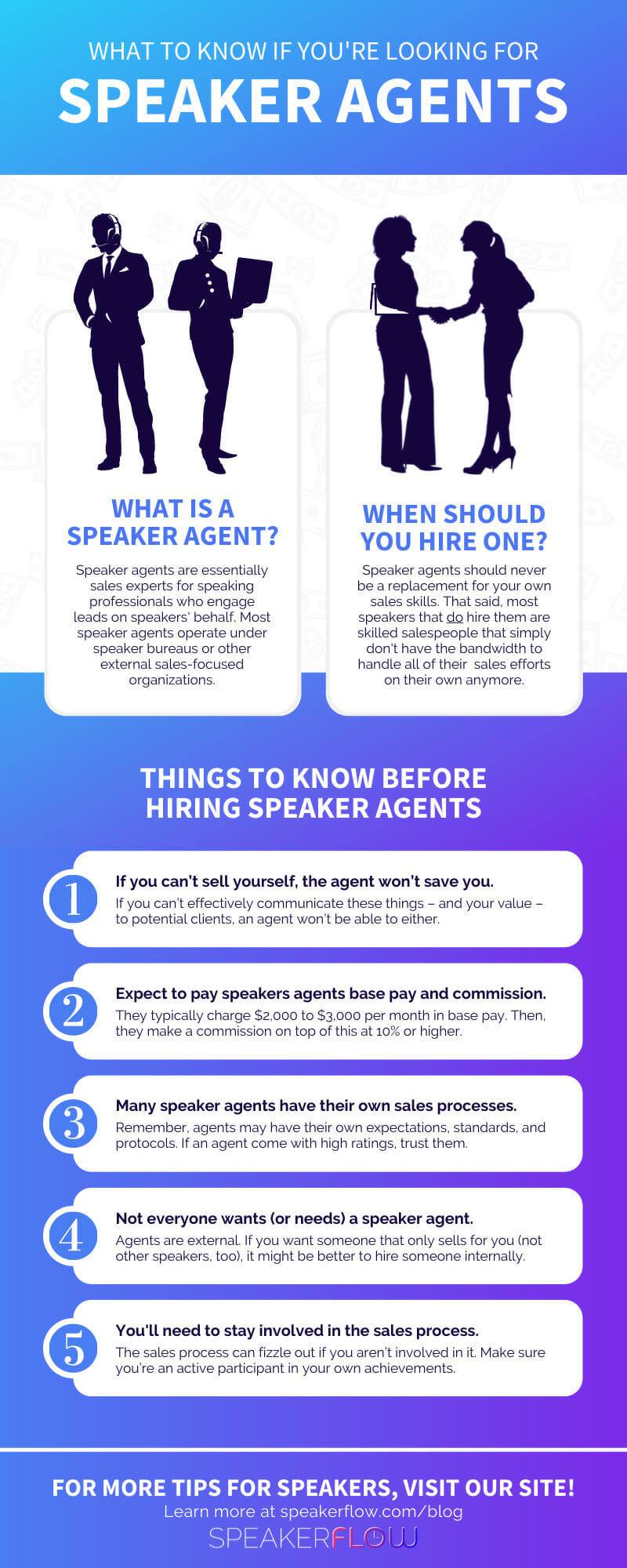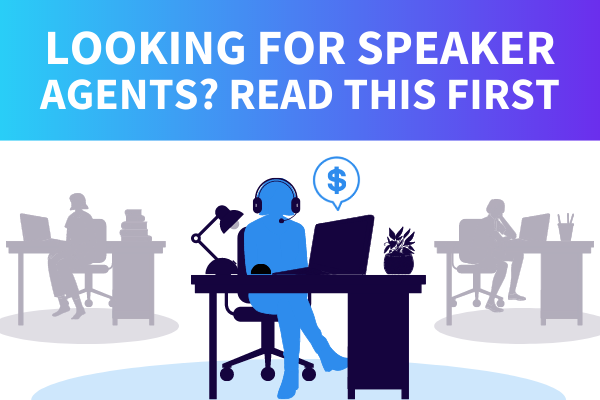No matter where you’re at in your professional speaker journey, you might be wondering about recruiting the help of a speaker agent. Though all speakers want to land more gigs, they also know selling yourself is hard. Handing the sales aspect off to speaking agents means the speaker has the time to focus on other aspects of their career and brand.
While having a speaker agent is a way to boost your business, it’s not right for everyone. This Tom Broxham quote sums it up simply: “The people who have agents don’t need them and the people who need them can’t get them.” As a speaker, you need to have a strong foundation in selling yourself and recommending your unique voice. It’s normal if you need help to develop these skills, but they’re not optional in today’s world.
Still, there’s a lot of demand for speaker agents in the speaking space. Having someone to approach clients on your behalf is a luxury, but that doesn’t mean you should rush into a contract. The right speaker agent takes things off your plate, letting you concentrate on the crucial aspects of your business. The wrong speaker agent is costly and doesn’t make your life any easier.
With that in mind, if you’re looking for speaker agents, you’re in the right place. Read this guide before you sign any contracts with a speaker agent, bureau, or other professional representative. As speaking industry experts ourselves, we understand the ins and outs of hiring agents for speakers from both sides.
What are speaker agents?
First, what are speaker agents? If you’re new to speaking as a profession or income revenue, you might not even know agents exist in this industry. Speaker agents are essentially sales experts for speaking professionals. Though their primary responsibility is usually engaging leads on your behalf, they also act as an in-between for you and event planners.
Most speaker agents operate under speaker bureaus. These are organizations that help market speakers, like Premier Speakers Bureau or Keppler Speakers. However, there are some speaker agents that operate on their own. Just like sports agents represent pro athletes, speaker agents represent thought leaders, pro speakers, and business experts.
Aside from helping with sales and marketing, speaker agents often handle other lower paycheck tasks. These are things that take up time, but they’re not necessarily making you money. These tasks include:
- Booking travel for events
- Sourcing leads
- Administration tasks
- Business development
- Event management
- Sending email queries
When should you consider speaker agents?
Next, when should you consider hiring a speaker agent? Before you hire a speaker agent, you need to know whether it’s the right fit for you. While there’s a growing need for speaker agents, they’re in no way expected or required. Many speakers and thought leaders operate solely by themselves, or they outsource to other professionals for lower-level tasks.
You can become a successful, paid speaker without a speaker agent. Agents should never be a replacement for your own sales skills. You’ll quickly discover that you’re still heavily involved, especially with the closing of sales.
What are the reasons someone might hire a speaker agent?
- Sales: Though not a replacement for sales expertise, speaker agents are selling professionals. They can help strengthen your own skills and increase leads.
- Professional: Having someone approaching clients on your behalf does carry its own weight and professionality.
- Bandwidth: Lastly, if you’re struggling to operate your business and handle sales outreach on your own, you need to get some help. A speaker agent is there to pick up your slack so you don’t fall behind and miss opportunities.
Believe it or not, most speakers don’t hire agents right away when they’re first getting started. It’s something that’s common when speakers are already well established in their space.
What do I need to know before hiring speaker agents?
Now, what do you need to know if you’ve decided to hire a speaker agent? There are some cold, hard truths to make peace with before you consider a speaker agent. Though they’re often painted as fairy godmothers of the speaking world, they can only work their magic if you have a strong foundation in place.
If you can’t sell yourself, the agent won’t save you.
To begin, if you can’t sell yourself, don’t think of a speaker’s agent as a bandaid. Everything about you—your message, your speaking style, and your brand—needs to be airtight before hiring an agent. If you can’t effectively communicate these things – and your value – to potential clients, an agent won’t be able to either.
This is why many speaker agents have the mentality of “we’ll find you” instead of the other way around. If you’re an outstanding speaker and salesperson, a bureau or agent connects with you naturally. This is also why established speakers are the ones most likely to have an agent lined up. Before you focus on getting an agent, make sure you know how to sell yourself with confidence. There are no magic tricks or quick fixes in this space.
How To Build Your Sales Skills

How can you learn to sell yourself? You don’t have to be gifted with natural sales skills to become a confident salesperson. These are skills you can always learn and develop. Not sure where to begin? Start here:
- Confidence: Think of the smoothest talkers you know. Those who always seem to know the “right” thing to say and know everyone have one thing in common: confidence. Even if you don’t feel it, you can always fake it ‘till you make it. In a professional setting, confidence is what gets you through the door.
- Persistence: Speaking of cliches, what about this one: “The squeaky wheel gets the oil.” You’re facing a lot of competition as a speaker. You need to be persistent with your leads.
- Problem-solver: Sales is about problem-solving. Your prospects have a need (usually to hire an expert speaker or thought leader). You’re the solution, so make sure your value is clear. People don’t want to hear about you, they want to know how you’ll solve their problem.
- Learn: Lastly, continue to learn as you go. No salesman was born landing every gig. This is a muscle that takes exercise, and it’s something you can grow over time.
Expect to pay speakers agents base pay and commission.
Second, recognize that speaker agents aren’t free. Like all agents in all industries, they’re paid either a base pay, commission, or both. Speaker agent fees vary depending on the industry, location, and experience level. These rates are charged on a yearly or monthly basis. If you’re barely breaking even with your speaker fee, it’s not time to hire an agent. They can cost a pretty penny, and you should focus on investing in your business upfront.

Remember agents usually work as part of a sales organization (even if they’re not working with a bureau). You’re hiring them as a fellow service professional. They work with you, not for you. If your speaking fee is relatively low, it might be hard to find an agent willing to work with you. Because they’re usually paid in commission, they want to work with pros who already have a steady stream of income. They also work with several speaking professionals at a time, giving them more reliability with income.
With that in mind, how much do speaker agents actually make? They typically charge $2,000 to $3,000 per month in base pay. Then, they make a commission on top of this at 10% or higher. That means if you’re paid $15,000 for a speaking gig, they will make around $1,500 on top of their base pay. As you can see from the math here, this adds up quickly.
Are there some speaker agents willing to work for less? It ultimately depends on their experience level and reputation. However, the right speaker agent is worth the investment. Because they’re landing you more speaking gigs (and higher revenue), they can pay off long-term.
Many speaker agents have their own sales processes.
Third, many speaker agents come with their own sales process. While some are willing to work in your existing CRM system, others won’t. This is something to ask during the interview process, especially if it’s important for you.
That said, if someone comes highly recommended and with high ratings, trust their process. Their experience speaks for itself. Because these are sales professionals, they might have insights into landing gigs that you can use to your advantage. Remember, these agents work with your team. They have their own expectations, standards, and protocols. As they continue to work with you, they might have suggestions and ideas that help you improve long-term.

The right speaker is familiar with the challenges you face in your business. They have a proven track record of success, and they’re ready to advocate for your business. Remember that sales experience comes in all shapes and sizes. Even if an agent has less experience selling within the speaking world, he or she might still have more than enough sales expertise to make up for it. You want someone who aligns with your goals, expectations, and needs.
You can expect an agent’s sales process to look something like the following:
- Prospecting leads and first meetings
- Scheduling meetings with potential clients/planners
- Identifying why you’re the right fit
- Handling objections and outwitting competitors
- Finalize the sale
- Follow up to get feedback and encourage referrals
While it’s good to have your own process in place, don’t be alarmed if your agent has his or her own ideas. Together, you should collaborate to create something worthwhile and actionable. There’s no such thing as “right” or “wrong.” All that matters is that your system drives results.
Not everyone wants (or needs) a speaker agent.
With that in mind, we have to also share a big truth: not everyone wants a speaker agent. Beyond this, not everyone needs one. Agents are external. While they can help you achieve your goals, they’re not a part of your business. If you want to build a long-term relationship with someone who’s invested in your success and process, it might be better to hire someone internally. Similarly, if you still don’t have a reliable source of leads, it’s a good idea to hold off for now.

Speakers agents work with several speakers at a time. While this can be a way to grow their professional network, they also have less time to focus on your career alone. Hiring someone internally (or doing the work yourself) lets you put your own growth first. This is a decision all speakers have to make for themselves based on their own goals. There are no simple answers.
When is it a good idea to skip the speaker agent?
- You’re new to getting paid to speak.
- You’re not focusing on growing your income (or you’re speaking for free).
- Your current workload is under control and manageable.
- It makes more financial sense to hire someone full-time or part-time internally.
- You’re comfortable and successful selling yourself.
You have to ask yourself these questions truthfully. If you agree with any of the situations above, odds are you’re not in the right place to hire a speaker agent. This isn’t a negative thing! There are many advantages to working alone, and this doesn’t have to hold you back. Like all things business, there are pros and cons of working with an agent vs on your own. It’s far from one-size-fits-all. Just because some speakers find agents helpful doesn’t mean this is true across the board.
Stay involved in the sales process.
Last but not least, a sales agent isn’t something you “set and forget.” You’ll need to continuously stay involved in the sales process. While many speaker agents help you facilitate leads, you’ll still be closing most deals yourself. Your goal is to make it as easy as possible for your agent to sell you.

Think of it this way: your speaker agent is in the business of making money. They want to focus on growing their clients that they know perform the best and land the most sales. SpeakerFlow’s CEO, Taylorr, says it best, “The more they can sell you, the more that they’re going to prioritize you in their sales process (since they may represent more than one speaker).” Vetting speaker agents isn’t a quick process, and it doesn’t end once you hire a professional. This is an ongoing relationship you maintain throughout your career.
No matter where you find this professional (network, inner circle, speaker bureau), this is someone who’s going to represent you. While your needs depend on where you’re at in your speaking business, there are some things consistent across the board. Make sure they have all of the following skills (and more):
- Interpersonal people skills
- Understanding of your industry
- Speaking industry experience
- Sales background
When you and your speaker agent have an understanding and clear expectations from the start, this is a beneficial relationship for everyone. You should never rush the process of finding the right speaker agent, and don’t rush through training. This is an investment in your career. The sales process can fizzle out early if you aren’t involved in the entire process. As we said above, you’re always your own biggest advocate. Make sure you’re an active participant in your own achievements.
Final Thoughts on Speaker Agents
Ultimately, you can’t just hire a speaker agent and expect your business to magically fall into place. You need to have a strong, sellable foundation in place before you hire anyone for your business. This is especially true when hiring someone whose role is to sell on your behalf.
While it’s true hiring a speaker agent can pay off long-term, you need to invest in this relationship upfront. There are no quick fixes when it comes to getting bookings. However, if you’re an experienced speaker who needs someone to help make arrangements and follow up on leads, a speaking agent might be right for you.







